Verdict
In sonic terms the Mach 70 have plenty to recommend them, even if some additional low frequency wouldn’t go amiss. As objects, though, they don’t remotely live up to the asking price.
Pros
- Sonic detail and insight to spare
- Lightweight and comfortable design
- Good passive noise-isolation
Cons
- Need more low-frequency presence
- No unbalanced cable
- Perceived value is not great
-
DriversFeatures seven balanced armatures per earbud -
Frequency rangeGoes as low as5Hz and as high as 22kHz -
Ear-tips10 different pairs to fit different ear sizes
Introduction
The concept of the on-stage in-ear monitor was Westone’s in the first place – so it’s not a huge leap of imagination to suppose the company knows exactly what it’s doing where the consumer equivalent is concerned.
But with venerable brands from every continent looking to part you from a comfortable four figures for their alternatives, what have the Mach 70 got to help them stand out?
Availability
The Westone Mach 70 wired in-ear monitors are on sale now, and in the United Kingdom they’re yours for £1399. In their native America they sell for $1399, while in Australia they’re more like AU$2099. Remarkably, this sort of pricing makes equivalent high-end IEMs from companies as auspicious as Sennheiser and Shure look like bargains…
Design
- Light and ergonomic earbuds
- Light and slim cable
- Not much perceived value
It’s quite an achievement on Westone’s part to have found space for seven balanced armature drivers in earbuds so lightweight and compact. The earbuds are carefully shaped, and once in place using the familiar ‘twist/lock’ action they stay comfortable for hours at a time. Add in a cable that’s slender and equally light, and you’ve a pair of wired IEMs that are no burden whatsoever to wear.
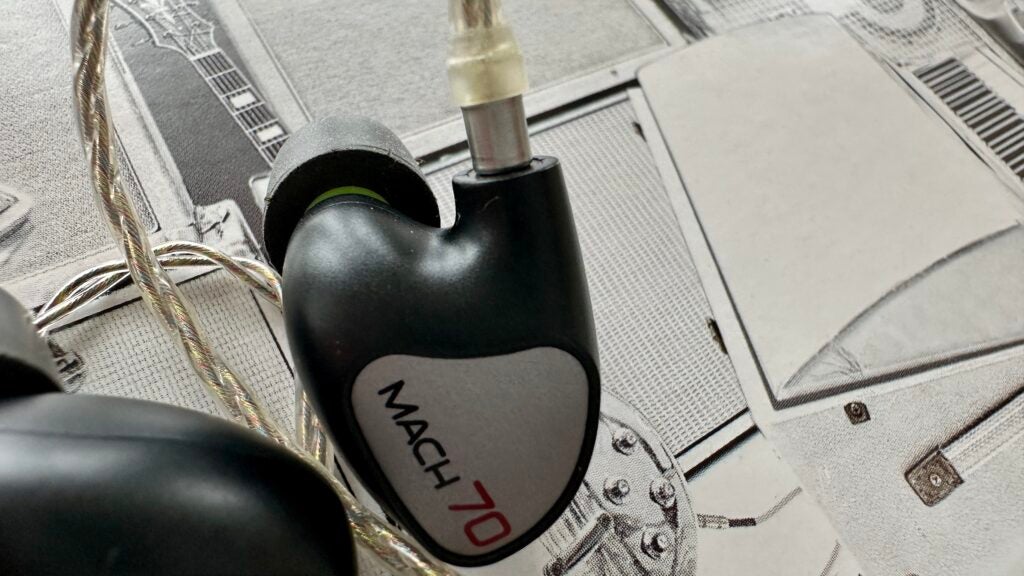
Build quality and finish is good, too – which is the least you’re entitled to expect at the price. The casing is smooth, the seam where its two sections join is nigh-on invisible… but unlike Audeze (for instance) or Sennheiser (especially), Westone appears to have gone to no lengths at all to create a perception of the Mach 70 as a premium product. There’s no tactility here, no visual drama – and that grey plate with the ‘Mach 70’ legend on it is as plasticky as it looks.
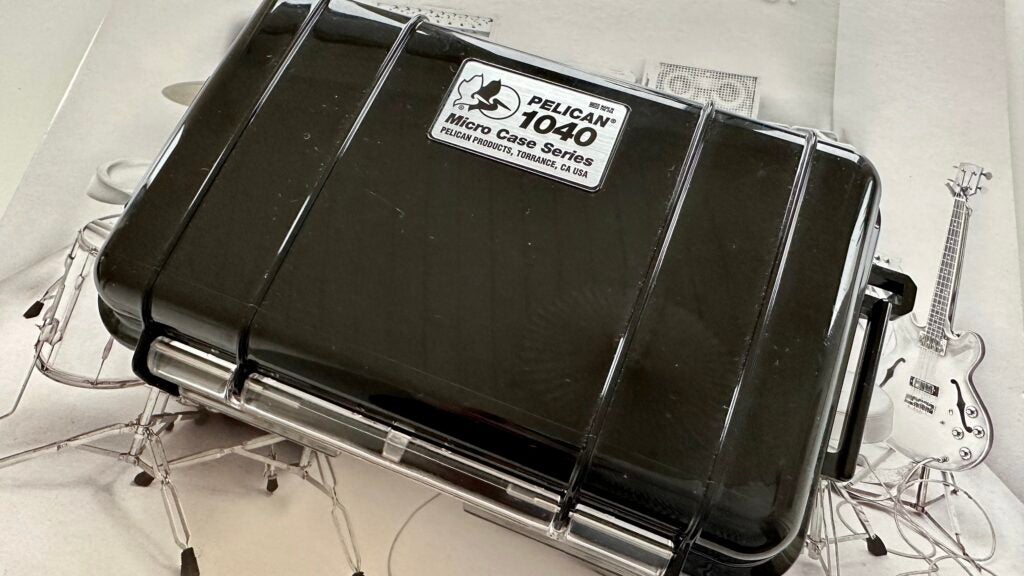
Features
- Seven balanced armatures per earbud
- Linum Estron UltraBaX cable
- Extensive selection of eartips
So yes, as already mentioned: there are no fewer than seven balanced armature drivers in each Mach 70 earbud. Four take care of treble response, a couple more handle the midrange, and the one remaining looks after the low frequencies.
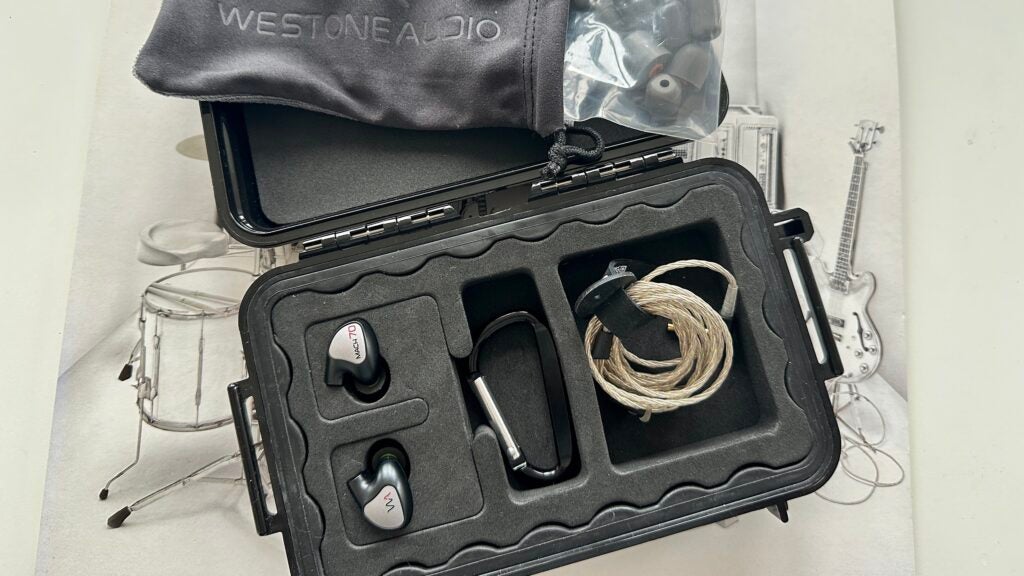
The earbuds use T2 connectors to attach to 127cm of Linum Estron UltraBaX cable. This is a silver-plated copper, double-twisted litz design that’s renowned for its super-low microphonics and crosstalk. It’s very light at just 6g, slimmer than seems possible, and is skin-friendly too.
Westone supplies the Mach 70 in a sturdy Pelican hard-case, and as well as the cable, the earbuds and, oddly, a carabiner clip, the box contains a soft carry-pouch and no fewer than ten pairs of eartips. Unofficially, they’re sized from ‘very small’ to ‘extremely large’ – and there are five pairs in silicone and five pairs in foam.
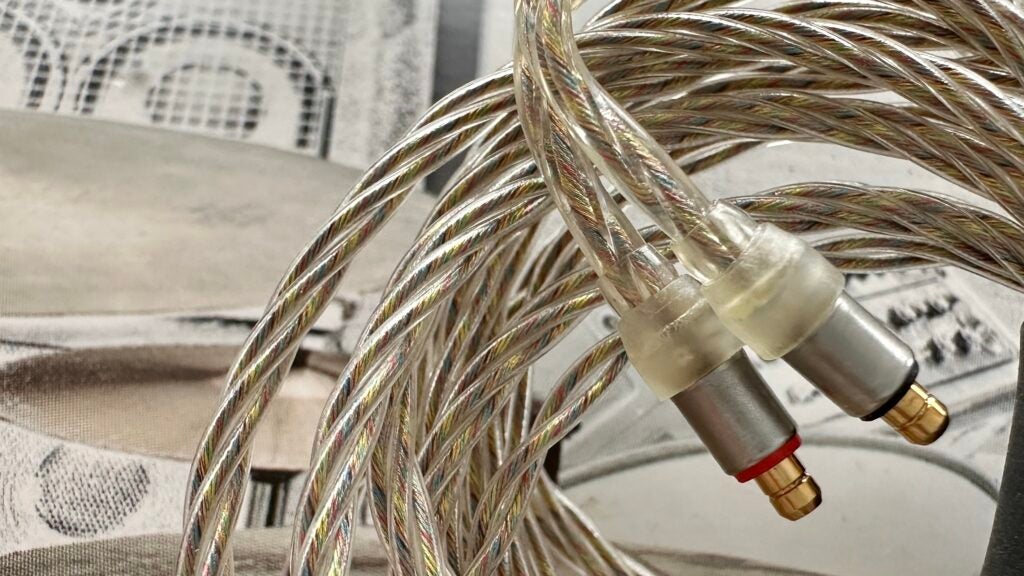
There’s only one cable, though – and to double my disappointment at this fact, it’s terminated in an unbalanced 3.5mm jack. Quite a few rivals are supplied with 2.5mm or 4.4mm balanced alternatives in addition to a 3.5mm cable, or even both – but Westone doesn’t even supply a 6.3mm adapter.
Sound Quality
- Open, eloquent, and positive sound
- Sky-high levels of detail and insight
- Short of low-end substance
Because of the way Westone supplies the Mach 70, you’re restricted to using sources (or headphone amps) with unbalanced outputs – and, unless you’ve got a 6.3mm adapter handy, sources with 3.5mm unbalanced outputs. And this rules out virtually every smartphone – although it seems unlikely anyone with this sort of money to spend on IEMs is going to pair them directly with a smartphone anyway.
Attached to an appropriate source and with a chunky 24-bit/96kHz file of PJ Harvey’s I Inside the Old Year Dying playing, the Mach 70 are immediately, and in many ways profoundly, impressive. In fact, even before they start making a sound, the combination of light weight, ergonomic good sense, and the guarantee of a pair of eartips that fit really well, their passive noise isolation creates a great first impression.
Once up and running, the amount of detail they can extract and reveal in a recording is really quite startling. Where tone and texture are concerned, as well as the small harmonic variations evident in individual instruments, the Mach 70 are almost fanatical in the attention they pay. They identify even the most minor and/or transient events without effort, and always give them appropriate weighting.
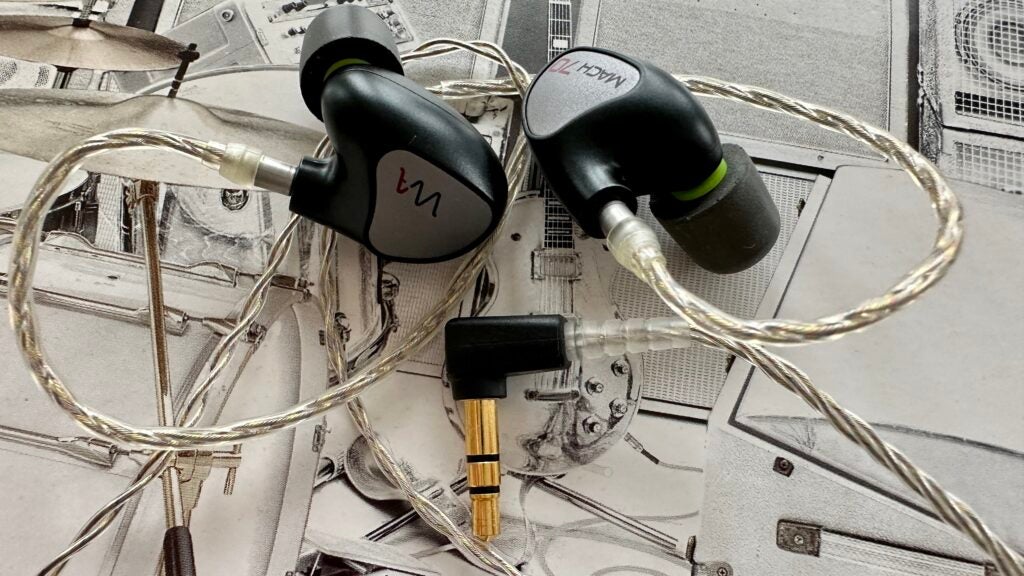
This talent combines well with an equal skill in soundstaging. These IEM create a remarkably open, spacious, and expansive soundstage, and organise a recording upon it with absolute authority. Every strand of a recording gets plenty of elbowroom in which to express itself – but at the same, time, the Mach 70 are skilled at creating a unity and a singularity of performance from even a disparate or complex recording. Their facility with timing, the ability to conjure the sensation of commonality from a recording, is always evident.
From the top of the frequency range to the bottom, the Westone are smoothly integrated and generally nicely balanced. The high frequency reproduction here is crisp and bright, but there’s plenty of substance to go along with the treble shine that’s available. And in the midrange, the Mach 70 communicate with real freedom, giving vocalists of all kinds real eloquence – no matter if they’re crooners, shouters, accomplished technicians or complete chancers.
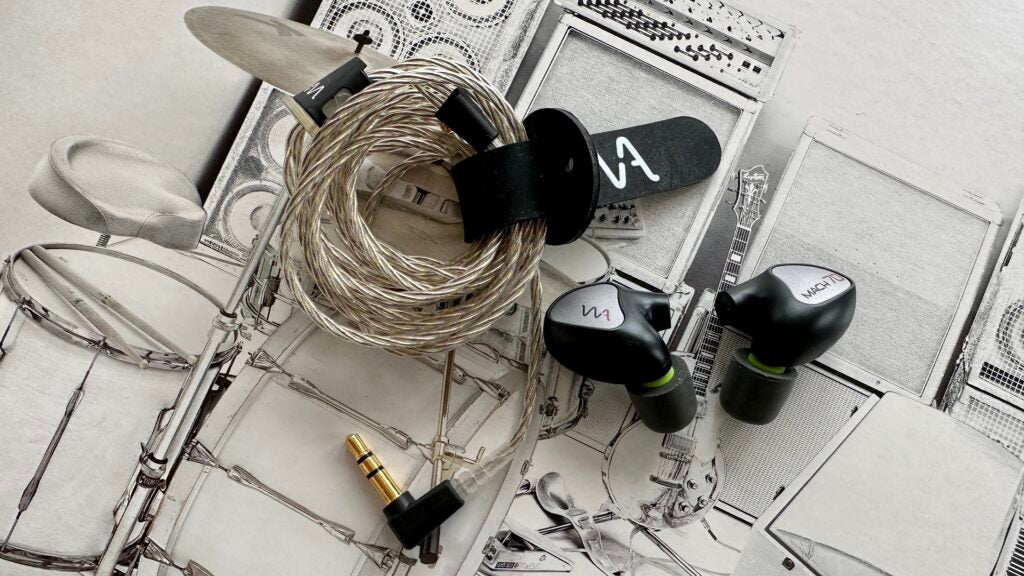
There are similar levels of conviction, of positivity, detail, and control, as the bottom of the frequency range as elsewhere. Attack of bass sounds is straight edged, which means rhythms are described confidently, and attack is managed with complete conviction too. Momentum is considerable, and there’s real alacrity to the way the Mach 70 snap into and out of low frequency occurrences.
What there isn’t, though, is a great deal of body or substance to the bass the Westone generate. There’s rapidity, yes, a great deal of detail regarding shape and texture, and plenty of all-around fidelity – but there’s no two ways about it, the Mach 70 could be a punchier and more robust listen.
That’s not to say they’re short of dynamic headroom, you understand. The distance between the smaller, softer instances of a recording and its full-on attack overload is considerable. It’s just that there’s not as much low-frequency meat on the bones as is ideal.
Latest deals
Should you buy it?
You intend to listen to your high-end source of music for hours at a time: If there’s a more comfortable wired high-end IEM out there, it hasn’t yet made it as far as Trusted Reviews.
You don’t own a high-end source of music: The Mach 70 aren’t exactly judgemental, but they only begin to sound like the money’s-worth when paired with a capable music player.
Final Thoughts
You spend this sort of money on IEMs first and foremost to get flawless sound quality, of course – and while they’re not flawless, the Westone Mach 70 are deeply impressive in many sonic departments.
But I refuse to believe that anyone laying this sort of money down doesn’t want to be made to feel good about their purchase in other ways, too – at the very least you’re entitled to expect some mad drama a la Campfire Audio, or some complicated machining of premium materials such as is provided by Sennheiser. There’s none of this with the Mach 70, not even a hint.
How we test
We test every set of headphones we review thoroughly over an extended period of time. We use industry standard tests to compare features properly. We’ll always tell you what we find. We never, ever, accept money to review a product.
Find out more about how we test in our ethics policy.
Tested with real world use
FAQs
The Mach 70 is only supplied with an unbalanced connection, so the best performance is had with unbalanced outputs/sources.
Verdict
In sonic terms the Mach 70 have plenty to recommend them, even if some additional low frequency wouldn’t go amiss. As objects, though, they don’t remotely live up to the asking price.
Pros
- Sonic detail and insight to spare
- Lightweight and comfortable design
- Good passive noise-isolation
Cons
- Need more low-frequency presence
- No unbalanced cable
- Perceived value is not great
-
DriversFeatures seven balanced armatures per earbud -
Frequency rangeGoes as low as5Hz and as high as 22kHz -
Ear-tips10 different pairs to fit different ear sizes
Introduction
The concept of the on-stage in-ear monitor was Westone’s in the first place – so it’s not a huge leap of imagination to suppose the company knows exactly what it’s doing where the consumer equivalent is concerned.
But with venerable brands from every continent looking to part you from a comfortable four figures for their alternatives, what have the Mach 70 got to help them stand out?
Availability
The Westone Mach 70 wired in-ear monitors are on sale now, and in the United Kingdom they’re yours for £1399. In their native America they sell for $1399, while in Australia they’re more like AU$2099. Remarkably, this sort of pricing makes equivalent high-end IEMs from companies as auspicious as Sennheiser and Shure look like bargains…
Design
- Light and ergonomic earbuds
- Light and slim cable
- Not much perceived value
It’s quite an achievement on Westone’s part to have found space for seven balanced armature drivers in earbuds so lightweight and compact. The earbuds are carefully shaped, and once in place using the familiar ‘twist/lock’ action they stay comfortable for hours at a time. Add in a cable that’s slender and equally light, and you’ve a pair of wired IEMs that are no burden whatsoever to wear.

Build quality and finish is good, too – which is the least you’re entitled to expect at the price. The casing is smooth, the seam where its two sections join is nigh-on invisible… but unlike Audeze (for instance) or Sennheiser (especially), Westone appears to have gone to no lengths at all to create a perception of the Mach 70 as a premium product. There’s no tactility here, no visual drama – and that grey plate with the ‘Mach 70’ legend on it is as plasticky as it looks.

Features
- Seven balanced armatures per earbud
- Linum Estron UltraBaX cable
- Extensive selection of eartips
So yes, as already mentioned: there are no fewer than seven balanced armature drivers in each Mach 70 earbud. Four take care of treble response, a couple more handle the midrange, and the one remaining looks after the low frequencies.

The earbuds use T2 connectors to attach to 127cm of Linum Estron UltraBaX cable. This is a silver-plated copper, double-twisted litz design that’s renowned for its super-low microphonics and crosstalk. It’s very light at just 6g, slimmer than seems possible, and is skin-friendly too.
Westone supplies the Mach 70 in a sturdy Pelican hard-case, and as well as the cable, the earbuds and, oddly, a carabiner clip, the box contains a soft carry-pouch and no fewer than ten pairs of eartips. Unofficially, they’re sized from ‘very small’ to ‘extremely large’ – and there are five pairs in silicone and five pairs in foam.

There’s only one cable, though – and to double my disappointment at this fact, it’s terminated in an unbalanced 3.5mm jack. Quite a few rivals are supplied with 2.5mm or 4.4mm balanced alternatives in addition to a 3.5mm cable, or even both – but Westone doesn’t even supply a 6.3mm adapter.
Sound Quality
- Open, eloquent, and positive sound
- Sky-high levels of detail and insight
- Short of low-end substance
Because of the way Westone supplies the Mach 70, you’re restricted to using sources (or headphone amps) with unbalanced outputs – and, unless you’ve got a 6.3mm adapter handy, sources with 3.5mm unbalanced outputs. And this rules out virtually every smartphone – although it seems unlikely anyone with this sort of money to spend on IEMs is going to pair them directly with a smartphone anyway.
Attached to an appropriate source and with a chunky 24-bit/96kHz file of PJ Harvey’s I Inside the Old Year Dying playing, the Mach 70 are immediately, and in many ways profoundly, impressive. In fact, even before they start making a sound, the combination of light weight, ergonomic good sense, and the guarantee of a pair of eartips that fit really well, their passive noise isolation creates a great first impression.
Once up and running, the amount of detail they can extract and reveal in a recording is really quite startling. Where tone and texture are concerned, as well as the small harmonic variations evident in individual instruments, the Mach 70 are almost fanatical in the attention they pay. They identify even the most minor and/or transient events without effort, and always give them appropriate weighting.

This talent combines well with an equal skill in soundstaging. These IEM create a remarkably open, spacious, and expansive soundstage, and organise a recording upon it with absolute authority. Every strand of a recording gets plenty of elbowroom in which to express itself – but at the same, time, the Mach 70 are skilled at creating a unity and a singularity of performance from even a disparate or complex recording. Their facility with timing, the ability to conjure the sensation of commonality from a recording, is always evident.
From the top of the frequency range to the bottom, the Westone are smoothly integrated and generally nicely balanced. The high frequency reproduction here is crisp and bright, but there’s plenty of substance to go along with the treble shine that’s available. And in the midrange, the Mach 70 communicate with real freedom, giving vocalists of all kinds real eloquence – no matter if they’re crooners, shouters, accomplished technicians or complete chancers.

There are similar levels of conviction, of positivity, detail, and control, as the bottom of the frequency range as elsewhere. Attack of bass sounds is straight edged, which means rhythms are described confidently, and attack is managed with complete conviction too. Momentum is considerable, and there’s real alacrity to the way the Mach 70 snap into and out of low frequency occurrences.
What there isn’t, though, is a great deal of body or substance to the bass the Westone generate. There’s rapidity, yes, a great deal of detail regarding shape and texture, and plenty of all-around fidelity – but there’s no two ways about it, the Mach 70 could be a punchier and more robust listen.
That’s not to say they’re short of dynamic headroom, you understand. The distance between the smaller, softer instances of a recording and its full-on attack overload is considerable. It’s just that there’s not as much low-frequency meat on the bones as is ideal.
Latest deals
Should you buy it?
You intend to listen to your high-end source of music for hours at a time: If there’s a more comfortable wired high-end IEM out there, it hasn’t yet made it as far as Trusted Reviews.
You don’t own a high-end source of music: The Mach 70 aren’t exactly judgemental, but they only begin to sound like the money’s-worth when paired with a capable music player.
Final Thoughts
You spend this sort of money on IEMs first and foremost to get flawless sound quality, of course – and while they’re not flawless, the Westone Mach 70 are deeply impressive in many sonic departments.
But I refuse to believe that anyone laying this sort of money down doesn’t want to be made to feel good about their purchase in other ways, too – at the very least you’re entitled to expect some mad drama a la Campfire Audio, or some complicated machining of premium materials such as is provided by Sennheiser. There’s none of this with the Mach 70, not even a hint.
How we test
We test every set of headphones we review thoroughly over an extended period of time. We use industry standard tests to compare features properly. We’ll always tell you what we find. We never, ever, accept money to review a product.
Find out more about how we test in our ethics policy.
Tested with real world use
FAQs
The Mach 70 is only supplied with an unbalanced connection, so the best performance is had with unbalanced outputs/sources.

























